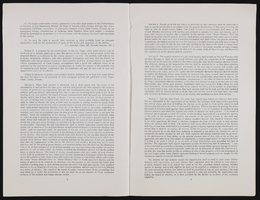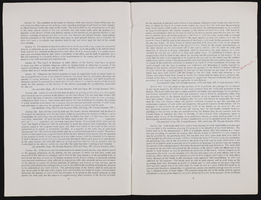Search the Special Collections and Archives Portal
Search Results
Joan Olson Griffith oral history interview
Identifier
Abstract
Oral history interview with Joan Olson Griffith conducted by Sharee Schrader on April 12, 2005 for the History of Blue Diamond Village in Nevada Oral History Project. Griffith begins by discussing why she moved to Blue Diamond, Nevada with her family due to job opportunities at the Blue Diamond Plant, where they manufactured wallboard, in 1956. She describes life in Blue Diamond and rural Nevada, the education available in the village, and Blue Diamond's proximity to Bonnie Springs Ranch and structures made for the filming of Western themed media. Griffith concludes by discussing how Blue Diamond has changed since the 1950s and being a Sunday school teacher for eighteen years.
Archival Collection
Kaweeda Adams oral history interview
Identifier
Abstract
Oral history interview with Kaweeda Adams conducted by Kim Kershaw on March 05, 2004 for the Public School Principalship Oral History Project. In this interview, Adams reflects upon her career as a teacher in Louisiana from the 1980s to the 1990s, and as a teacher and administrator with Nevada’s Clark County School District (CCSD) from the 1990s to the early 2000s. She discusses her upbringing, and how her upbringing influenced her pursuit of education. She describes the process by which she became a teacher and eventually administrator, and compares her experiences working in Louisiana and Nevada. She discusses how these experiences shaped her philosophy of education, as well as changes that she has observed in the students over time. She describes her regular job duties, as well as challenges that she faced as a school administrator such as teacher dismissal and evaluations.
Archival Collection
Nevada Watercolor Society Records
Identifier
Abstract
The Nevada Watercolor Society Records (1969-2009) contain watercolor paintings and organizational records pertaining to the Nevada Watercolor Society, a non-profit organization that aims to promote watermedia painting and art appreciation. Organizational records contain materials including by-laws, articles of incorporation, newsletters, exhibit information, tax and financial records, receipts, photographs, negatives, and newspaper clippings. The collection also includes paintings by society members and newspaper clippings about art exhibitions and artists in Las Vegas, Nevada.
Archival Collection
Patricia Becker Scrapbooks
Identifier
Abstract
The Patricia Becker Scrapbooks reflect the professional activities of "Patty" Becker from 1976 to 2013. Materials include photographs, awards, correspondence, and newspaper articles documenting Patricia Becker's career. Included are articles related to her appointment as the Executive Director of the UNLV International Gaming Institute in 2005 as well as a Harrah's Senior Executive Organization Chart from 1984 to 1993.
Archival Collection

Maggie Arias-Petrel interview, May 3, 2019: transcript
Date
Archival Collection
Description
Maggie Arias-Petrel is a successful businessperson and philanthropist. Born in Quito, Ecuador in 1966, Maggie grew up during the Space Age, meeting astronauts through her father’s work as a NASA engineer. Her mother worked as a teacher in an all-girls school. When she was a teenager, Maggie visited her aunt in California and decided to stay in the U.S. She eventually returned to Ecuador and helped her mother run her toy store business, helping her manage multiple locations. Her entrepreneurship flourished as she helped the family business grow into a successful enterprise. Despite the success in her home country, Maggie always dreamed of coming back and living in the U.S. When her family returned, they settled in Las Vegas in 1991. Through her entrepreneurship, Maggie helped many doctors set up their practices, and began her own consulting business, Global Professional Consulting. Today, her expertise includes over 20 years of medical practice management, marketing and advertising for medical and legal, business development and consulting experience. Maggie is also the Chairwoman of the Executive Board of Directors of the Latin Chamber of Commerce of Nevada. She is responsible for changing the direction of the Chamber and helping it become what it is today. She is also the director of the Señoras of Excellence, a philanthropic organization that focuses on raising funds to help Latino students attend college. They have awarded thousands of dollars in scholarship funds to students across the Las Vegas Valley. Because of her work in the medical field, Maggie understands the importance of affordable health care and accessibility. During the Obama Administration, she was part of Senator Harry Reid’s promotion team for the Affordable Health Care Act. She also worked with Governor Jim Gibbons doing international research work in Mexico, and was invited to the White House for the Cinco de Mayo celebration through the U.S. Hispanic Chamber and the Latino Coalition. Maggie is also responsible for the partnership between the Universidad Autónoma de Guadalajara, one of the most prestigious and accomplished institutions of higher education in Mexico, St. Rose Dominican Hospitals, and the Nevada System of Higher Education to develop nursing programs with direct collaboration from UAG to increase the number of bilingual-bicultural medical professionals in Nevada. She is the director for the Workforce Connections of Nevada Board and the Dignity HealthCare - St. Rose Dominican Hospital Board of Directors. Maggie has also received numerous accolades and awards such as the Community Service Award from the Latin Chamber of Commerce, Señoras of Excellence Award given to woman who excel in their professions, the Excellence in Advocacy Award by The Colors of Lupus Foundation, and the “Woman in Business” Award by the National Coalition of 100 Black Women. In 2011, she was named one of the ten most influential Hispanics in the city by the Las Vegas Business Press. She is also one of the community leaders featured in the Las Vegas Latino Leaders Inaugural Edition Book. Maggie attended Los Angeles Mission College and Central University of Ecuador. She lives in Green Valley with her two sons.
Text

Andre King oral history interview: transcript
Date
Archival Collection
Description
Oral history interview with Andre "Brother Dre" King conducted by Claytee D. White on July 20, 2018 for the Remembering 1 October Oral History Project. In this interview, King recalls learning judo and wrestling at an early age. After spending ten years in prison for a burglary offense, he served an additional eleven years in facilities across the state. After twenty-one years in the system, King is now a nondenominational spiritual being and once he learned about the Healing Garden for 1 October victims, he went there daily, during and immediately after the construction. King has helped many survivors and has healed himself as well, through giving love, hugs, and spiritual inspiration.
Text




